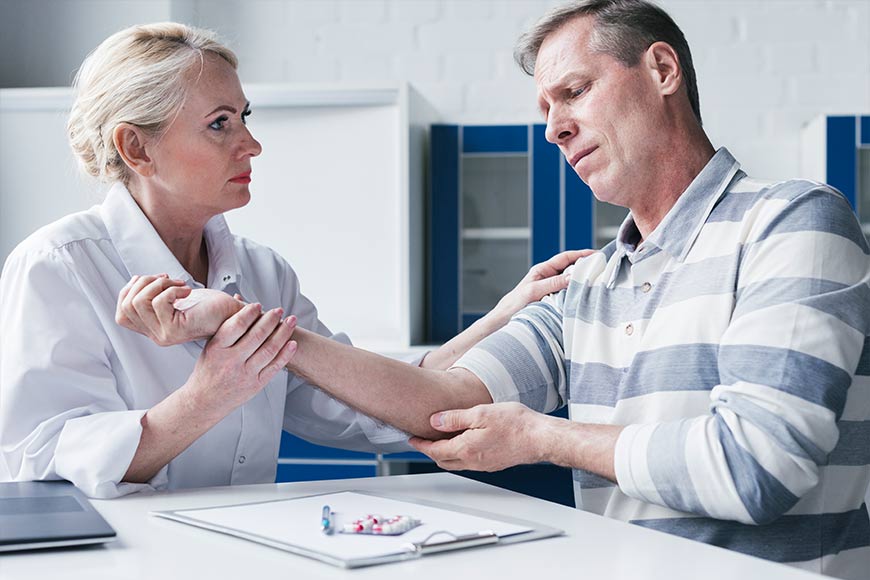
Parkinson's Disease Test
Parkinson’s Disease Test in Belgrade. TOP PRICE✓ Neurology✓ Early Symptom Detection, Accurate Diagnostics, EMG, MRI, and Expert Neurologists✓ Parkinson Test✓
Parkinson's Disease Test
Parkinson’s disease is a progressive neurological disorder that most commonly affects people over the age of 60, but it can also appear earlier. Early recognition of symptoms and timely diagnosis are crucial for effective management and improving quality of life.
If you notice tremors, slowed movements, muscle stiffness, or balance problems – it may be time to take a Parkinson’s disease test and consult with a specialist.
In this blog, learn what Parkinson’s testing involves, what the early symptoms are, and why it’s essential to seek help from an experienced neurologist.
What Are the Early Symptoms of Parkinson’s Disease?
Parkinson’s disease develops gradually, and symptoms worsen over time. Early signs can be subtle and are often mistaken for normal aging or stress. The most common early symptoms include:
-
Resting tremor – usually in the hands or fingers
-
Muscle stiffness – difficulty moving, feeling “tight”
-
Slowness of movement (bradykinesia) – performing daily tasks more slowly
-
Balance and walking difficulties – short steps, stooped posture
-
Changes in speech and facial expression – softer voice, reduced facial expressiveness
-
Writing problems – handwriting becomes small and cramped (micrographia)
If you notice any of these symptoms in yourself or a loved one, a Parkinson’s disease test can help identify the cause and guide the next steps.
What Does Parkinson’s Disease Testing Involve?
There is no single test that definitively confirms Parkinson’s disease, but a combination of clinical evaluation, neurological examination, and diagnostic tests help doctors make an accurate diagnosis.
1. Neurological Examination
A neurologist evaluates reflexes, muscle strength, coordination, gait, muscle tone, and facial expressions. This clinical exam is the most important part of the diagnostic process.
2. Questionnaires and Functional Tests
Standardized questionnaires and motor function tests are used to measure the severity and range of symptoms.
3. Dopamine Transporter Scan (DaTscan)
In certain cases, nuclear medicine imaging (SPECT scan) is used to visualize dopamine receptors in the brain and differentiate Parkinson’s from other conditions with similar symptoms.
4. MRI and CT Scans
While they don’t directly confirm Parkinson’s, these imaging methods help rule out other possible causes of symptoms such as tumors, strokes, or hydrocephalus.
How Long Does Parkinson’s Testing Take?
The duration depends on symptom complexity and required procedures. On average:
-
Neurological examination: 30–45 minutes
-
Neuropsychological testing (if needed): 60–90 minutes
-
Imaging (MRI/CT): 15–30 minutes
At Pulmo Sleep Center Eliksir, all necessary evaluations can be completed in a single day, without long waiting times – thanks to our experienced team and state-of-the-art diagnostic equipment.
Why Choose Pulmo Sleep Center Eliksir for Parkinson’s Disease Testing?
At Pulmo Sleep Center Eliksir, our experienced neurologists use advanced diagnostic methods to detect and manage Parkinson’s disease as early as possible. Our team is led by renowned neurology specialists, including Dr. Zorica Stević, one of the leading experts in Serbia in the diagnosis and treatment of Parkinson’s disease.
Dr. Stević has extensive experience working with patients facing complex neurodegenerative disorders and is known for her precise clinical approach, use of modern therapies, and dedication to each individual.
In our center, patients have access to:
-
Comprehensive neurological testing and functional assessments
-
Advanced imaging diagnostics (MRI, CT)
-
Neuropsychological testing and cognitive evaluations
-
Personalized treatment and therapy plans
-
Ongoing follow-up and support throughout treatment
Our Advice: Don’t Wait for Symptoms to Worsen
If you notice changes in movement, speech, balance, or facial expression – consult a neurologist for a professional evaluation and guidance. Early recognition of Parkinson’s disease allows for timely therapy and slowing of its progression.
How to Contact Us?
For more information about our services or if you have any questions, feel free to visit our CONTACT page and get in touch with us. We’re here to help!